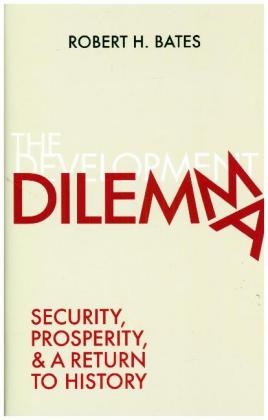
The Development Dilemma
Security, Prosperity, and a Return to History
Seiten
2017
Princeton University Press (Verlag)
978-0-691-16735-0 (ISBN)
Princeton University Press (Verlag)
978-0-691-16735-0 (ISBN)
Reassessing the developing world through the lens of Europe's past Today's developing nations emerged from the rubble of the Second World War. Only a handful of these countries have subsequently attained a level of prosperity and security comparable to that of the advanced industrial world. The implication is clear: those who study the developing
Reassessing the developing world through the lens of Europe's past Today's developing nations emerged from the rubble of the Second World War. Only a handful of these countries have subsequently attained a level of prosperity and security comparable to that of the advanced industrial world. The implication is clear: those who study the developing world in order to learn how development can be achieved lack the data to do so. In The Development Dilemma, Robert Bates responds to this challenge by turning to history, focusing on England and France. By the end of the eighteenth century, England stood poised to enter "the great transformation." France by contrast verged on state failure, and life and property were insecure. Probing the histories of these countries, Bates uncovers a powerful tension between prosperity and security: both may be necessary for development, he argues, but efforts to achieve the one threaten the achievement of the other. A fundamental tension pervades the political economy of development. Bates also argues that while the creation of a central hierarchy--a state--may be necessary to the achievement of development, it is not sufficient.
What matters is how the power of the state is used. France and England teach us that in some settings the seizure and redistribution of wealth--not its safeguarding and fostering--is a winning political strategy. These countries also suggest the features that mark those settings--features that appear in nations throughout the developing world. Returning to the present, Bates applies these insights to the world today. Drawing on fieldwork in Zambia and Kenya, and data from around the globe, he demonstrates how the past can help us to understand the performance of nations in today's developing world.
Reassessing the developing world through the lens of Europe's past Today's developing nations emerged from the rubble of the Second World War. Only a handful of these countries have subsequently attained a level of prosperity and security comparable to that of the advanced industrial world. The implication is clear: those who study the developing world in order to learn how development can be achieved lack the data to do so. In The Development Dilemma, Robert Bates responds to this challenge by turning to history, focusing on England and France. By the end of the eighteenth century, England stood poised to enter "the great transformation." France by contrast verged on state failure, and life and property were insecure. Probing the histories of these countries, Bates uncovers a powerful tension between prosperity and security: both may be necessary for development, he argues, but efforts to achieve the one threaten the achievement of the other. A fundamental tension pervades the political economy of development. Bates also argues that while the creation of a central hierarchy--a state--may be necessary to the achievement of development, it is not sufficient.
What matters is how the power of the state is used. France and England teach us that in some settings the seizure and redistribution of wealth--not its safeguarding and fostering--is a winning political strategy. These countries also suggest the features that mark those settings--features that appear in nations throughout the developing world. Returning to the present, Bates applies these insights to the world today. Drawing on fieldwork in Zambia and Kenya, and data from around the globe, he demonstrates how the past can help us to understand the performance of nations in today's developing world.
Robert H. Bates is the Eaton Professor of the Science of Government and professor of African and African American Studies at Harvard University. His books include Open-Economy Politics and Analytic Narratives (both Princeton).
List of Illustrations ix
Preface xi
1 Introduction 1
2 The Fundamental Tension 14
3 Taming the Hierarchy? 25
4 Forging the Political Terrain 49
5 The Developing World: Two Examples 62
6 The Use of Power 87
7 Conclusion 115
Addendum to Chapter 2 129
Addendum to Chapter 6 135
Addendum to Chapter 7 141
Notes 151
Bibliography 169
Index 181
| Erscheinungsdatum | 17.10.2017 |
|---|---|
| Zusatzinfo | 18 line illus. 5 tables. |
| Verlagsort | New Jersey |
| Sprache | englisch |
| Maße | 140 x 216 mm |
| Gewicht | 369 g |
| Themenwelt | Sozialwissenschaften ► Politik / Verwaltung ► Politische Theorie |
| Sozialwissenschaften ► Politik / Verwaltung ► Staat / Verwaltung | |
| Sozialwissenschaften ► Politik / Verwaltung ► Vergleichende Politikwissenschaften | |
| Wirtschaft | |
| ISBN-10 | 0-691-16735-4 / 0691167354 |
| ISBN-13 | 978-0-691-16735-0 / 9780691167350 |
| Zustand | Neuware |
| Haben Sie eine Frage zum Produkt? |
Mehr entdecken
aus dem Bereich
aus dem Bereich
Der »progressive« Angriff auf Israel, Judentum und …
Buch | Softcover (2024)
edition TIAMAT (Verlag)
CHF 39,20
ein Vortrag
Buch | Softcover (2024)
Suhrkamp (Verlag)
CHF 13,95
Geschichte, Vordenker, Organisationen
Buch | Softcover (2023)
C.H.Beck (Verlag)
CHF 18,90


